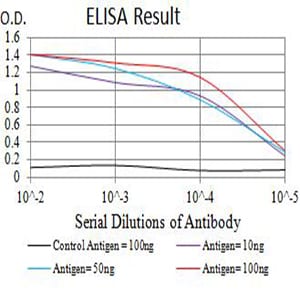
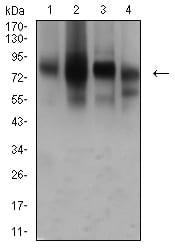
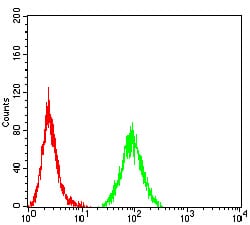
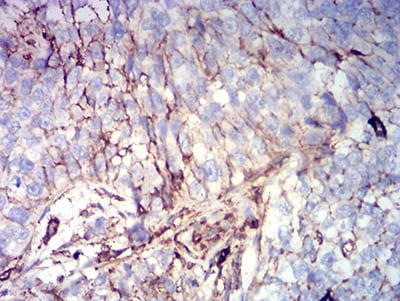
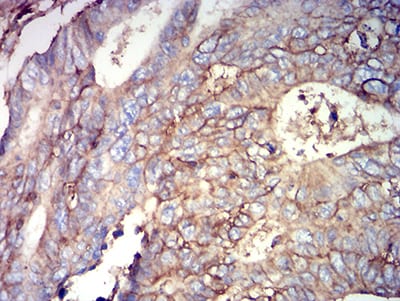
| WB | 1/500 - 1/2000 | Human,Mouse,Rat |
| IF | 咨询技术 | Human,Mouse,Rat |
| IHC | 1/200 - 1/1000 | Human,Mouse,Rat |
| ICC | 技术咨询 | Human,Mouse,Rat |
| FCM | 1/200 - 1/400 | Human,Mouse,Rat |
| Elisa | 1/10000 | Human,Mouse,Rat |
| Aliases | IN; LHR; MC56; MDU2; MDU3; MIC4; Pgp1; CDW44; CSPG8; HCELL; HUTCH-I; ECMR-III |
| Entrez GeneID | 960 |
| clone | 7F4F1 |
| WB Predicted band size | 81.5kDa |
| Host/Isotype | Mouse IgG1 |
| Antibody Type | Primary antibody |
| Storage | Store at 4°C short term. Aliquot and store at -20°C long term. Avoid freeze/thaw cycles. |
| Species Reactivity | Human |
| Immunogen | Purified recombinant fragment of human CD44 (AA: extra 36-194) expressed in E. Coli. |
| Formulation | Purified antibody in PBS with 0.05% sodium azide |
+ +
以下是3篇关于CD44抗体的代表性文献概览:
1. **《CD44: From adhesion molecules to signalling regulators》**
*作者:Ponta H, Sherman L, Herrlich PA*
摘要:该综述系统阐述了CD44分子作为跨膜粘附受体,通过结合透明质酸调控细胞迁移、增殖和存活的作用机制,并讨论了其抗体在靶向肿瘤干细胞中的应用潜力。
2. **《Targeting CD44-expressing cancer cells with anti-CD44 monoclonal antibody improves diagnostic and therapeutic outcomes》**
*作者:Zöller M*
摘要:研究证明特定CD44单克隆抗体可选择性识别肿瘤干细胞亚群,通过阻断CD44与微环境相互作用抑制肿瘤转移,为癌症诊断标志物开发及抗体治疗提供依据。
3. **《CD44 variant isoforms in inflammation and immune responses》**
*作者:Pure E, Assoian RK*
摘要:揭示了CD44不同剪接变体(如CD44v6)在炎症反应中的调控作用,通过特异性抗体阻断实验证实其参与白细胞募集及细胞因子信号传导通路。
4. **《A CD44-specific antibody for tracking and targeting cancer stem cells》**
*作者:Marhaba R, Zöller M*
摘要:开发了高特异性抗CD44单克隆抗体,验证其在体内外实验中可有效标记并抑制结直肠癌干细胞自我更新能力,为靶向治疗提供新工具。
注:以上为示例性概括,实际研究需通过数据库(如PubMed)获取完整文献。
CD44 antibodies target a family of transmembrane glycoproteins involved in cell-cell interactions, adhesion, migration, and signaling. The CD44 receptor binds hyaluronic acid (HA) and other extracellular matrix components, playing roles in inflammation, wound healing, and cancer progression. Its structure includes a conserved N-terminal ligand-binding domain, a variable region generated by alternative splicing (resulting in multiple isoforms), and a cytoplasmic tail that interacts with cytoskeletal and signaling molecules. The standard isoform (CD44s) is widely expressed, while variant isoforms (CD44v) are tissue-specific and linked to pathological states, particularly tumor metastasis and stemness.
CD44 is a marker for cancer stem cells (CSCs) in various malignancies, where it promotes survival, drug resistance, and metastatic spread. Antibodies against CD44 are critical tools for detecting expression patterns in research and diagnostics, often via flow cytometry, immunohistochemistry, or Western blot. Therapeutic CD44 antibodies are explored to block pro-tumorigenic signaling or deliver cytotoxic agents to CSCs. However, functional complexity arises from isoform diversity, post-translational modifications, and context-dependent roles in different microenvironments. Some antibodies specifically recognize epitopes in variant regions, while others target conserved domains, influencing experimental outcomes. Despite challenges, CD44 remains a compelling target for understanding cellular plasticity and developing precision therapies.
×